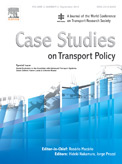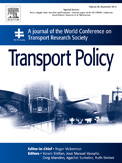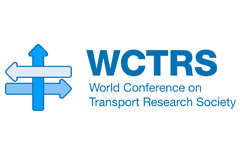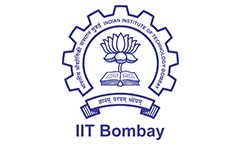Conference Sessions
Sessions and chairs
Topic Area A: Transport Modes – General (Thierry Vanelslander) View more +
Topic Area A covers research issues related to a single mode, and which are not addressed in other topic areas. In particular it provides a focus for the work of the tracks on Air, Maritime Rail, and Road (Urban and Intercity) Transport. Given the likelihood of overlap with the work of other topic areas, care will be needed to avoid duplication of activity. As a general rule, sessions should be included in Topic Area A only where the focus is on the characteristics of the mode, or it is clear that they cannot be integrated into other topic areas. In particular, papers on the safety of a given mode may be submitted to this Topic Area A, but will be copied to Topic Area C, where SIG C4 has the responsibility of convening all safety-related sessions.
Session tracks
-
1) SIG A1 Air Transport and Airports (Chikage Miyoshi and Martin Dresner) View more +
All research papers related to airlines, airports, and the air transport system may be submitted to this track. Research topics include, but are not limited to, aviation economics and policy, air transport forecasting, the regulatory environment for aviation, business and marketing strategies in air transport, productivity and efficiency issues, air transport operations, air transport navigation and control, and the competitive environment for air transport. Theoretical, conceptual and empirical papers are all welcome.
-
2) SIG A2 Maritime Transport and Ports (Enrico Musso and Thierry Vanelslander) View more +
This session track invites all kinds of papers dealing with a maritime and/or port topic. We stimulate papers to treat a key development in the port and maritime business, either at management, operational or policy level. Specific topics can be either in the field of maritime, port or hinterland economics, environmental issues, maritime engineering, investment and finance, cost optimization, chain optimization, human resources and employment and legal issues. We encourage interdisciplinarity, i.e. all disciplines can be treated (engineering, economics, legal, mathematic,…).
-
3) SIG A3 Rail Transport (John Preston, Yung-Cheng (Rex) Lai, and Marin Marinov) View more +
This session track focuses on research and education on rail technologies, with a particular focus on issues concerning operations, planning and economics. It covers issues with regards to both rail infrastructure and train services and to both passenger and freight services. It covers national systems and their components, including long distance, regional and urban (including metro and light rail) services. It also covers ‘classic’ and ‘high speed’ rail technologies and related guided technologies such as magnetic levitation.
-
4) A4 Road Transport - General (Gopal Patil)
Topic Area B: Freight Transport and Logistics (Johan Woxenius and Mike Browne) View more +
Includes freight carried by all modes of transport with a strong focus on the way in which freight modes are integrated – in particular the importance of intermodal transport and the relationship between freight transport and logistics management. Themes concerned with spatial aspects at many different levels are also included from global freight and logistics networks to the challenges of urban freight and city logistics. The contribution of freight modelling to decision-making and policy development, the application of ITS and the growing importance of humanitarian logistics are also part of the topic area. Environmental issues and the theme of sustainability are now of major relevance to many fields of freight transport and logistics. Papers concerned with sustainability and environmental issues will be allocated to session tracks in line with the main focus of the paper.
Session tracks
-
1) SIG B1 Logistics and Freight Transport Operations (Gunnar Stefansson and Maja Piecyk) View more +
The focus of the B1 Special Interest Group is on research connecting logistics and freight transport operations. Logistics management has significant impacts on transport operations and the group demonstrates the connection between logistics management and supply chain strategies and developments in freight transport operations. It address issues at local, regional, national and global levels and covers all industrial sectors including sourcing, manufacturing, distribution and retailing, across different transportation modes and does as well include the use of ITS in freight transport operations.
-
2) SIG B2 Humanitarian Logistics in Disasters (Eiichi Taniguchi, Russell G. Thompson, and Ali G. Qureshi)
-
3) SIG B3 Intermodal Freight Transport (Ralf Elbert and Jason Monios) View more +
Topics addressed include port hinterland issues, the performance of the inland transport movement and managing information flows as well as the digital transformation of intermodal transport chains. Governance issues relating to intermodal transport (including such issues as green corridors) together with the development of strategic networks are also included as are case studies with a national or regional dimension that reflect differences in intermodal markets around the world. Decision-making and methodological issues are also covered - for example, the evaluation of intermodal services and projects (including the link to emissions reductions). To support the publication of excellent papers subsequently of the conference, this session track currently negotiates to edit a special issue in Research in Transportation Business and Management.
-
4) SIG B4 Urban Goods Movement ( Michael Browne and Anne Goodchild)
-
5) SIG B5 Freight Transport Modeling (Lori Tavasszy and Hanno Friedrich) View more +
The Session Track includes the latest advances in mathematical models in the area of freight transportation for use in transport policy making. This includes descriptive freight and logistics models as well as optimization-oriented models that support infrastructure network design, network management, pricing and regulation.
Topic Area C: Traffic Management, Operations, and Safety (Zong Tian)
Session tracks
-
1) SIG C1 Traffic Theory and Modelling (Qiang Meng and Xiobo Qu Senior) View more +
This session track mainly covers transportation network analysis and traffic flow. It focuses on methodological development and/or applications with mathematical analysis. Typical areas include transportation network modelling and optimization, planning and management of autonomous/connected/electric vehicles, econometric and mathematical models to deal with transportation problems.
-
2) SIG C2 Urban Transport Operations (Zong Tian and Keshuang Tang)
-
3) SIG C3 Intelligent Transport Systems ( Ashish Bhaskar and Edward Chung) View more +
This session track covers scholarly research or technical discussions on the use of advance technologies and new data sources to address transport issues. This include, but are not limited to, new insights in multimodal network modelling, management, and monitoring; transport model calibration and validation; predictive analytics; data driven decision support systems; and connected and autonomous vehicles.
-
4) SIG C4 Traffic Safety Analysis and Policy ( Wael Alhajayseen and Geetam Tiwari)
View more +
This session track includes studies of human, infrastructure, operational and vehicular factors influencing the occurrence, type and severity of traffic crashes and injuries. It covers the design, implementation and evaluation of countermeasures, the modelling and statistical analysis of traffic crash data, as well as policy, planning and decision-making in traffic safety.
Topic Area D: Activity and Transport Demand (Bhargab Maitra) View more +
This topic area deals with understanding and modelling how people make choices regarding their activities and travel plans and how these interact with the transport system. It deals with theoretical constructs, behavioural assumptions, and methodologies for the analysis, representation, inference and modelling of the way travellers behave and the interrelationships of this behaviour with their activities and the transport system. This subject area includes all topics related to the analysis of travel demand and behaviour and their interactions with time use, and the environment.
Session tracks
-
1) SIG D1 Data Collection and Processing Methods ( Patrick Bonnel) View more +
As transport models heavily rely on good quality data, model selection should be jointly considered with data availability. Data needs refer both to travel behaviour, but also to their determinants (attitudes, motivations, preferences) and to the context. This track addresses issues associated to: travel surveys design and analysis; quality and quantity of data obtained with various data collection methods; benefits and challenges of cross-sectional, continuous and longitudinal surveys; using ‘big-data’ sets; new technology-based data collections – GPS, mobile, smart card; triangulation and combination of various data sources; data archiving (travel surveys, networks and contextual data).
-
2) SIG D2 Travel Behaviour and Choice Modeling (Chandra Bhat) View more +
Disaggregate choice models are at the forefront of methodological innovations in understanding and predicting traveler behaviour. This track highlights the need for developing models to better understand behaviour and applying them in policy-related situations, especially for assessing changes in relation to new interventions. This session track welcomes papers looking at: new applications of discrete choice models – including both stated and revealed preference data; new advances in modelling and experimental designs; models incorporating spatial dimension and uncertainty in choice modelling; hybrid models, latent class and latent construct models; predictive analytics related to big data and technology adoption.
-
3) SIG D3 Applications of Travel Behaviour Analysis and Demand Modeling Approaches (Bhargab Maitra)
View more +
“Travel Behavior” and “Travel Demand” are the two major aspects duly considered by researchers and practitioners in the context of transportation planning, traffic management, public transportation system, non-motorized transport, traffic safety, air transportation, freight transportation, etc. Since the last few decades, both traditional (econometric, statistical, etc.) and alternative (cluster analysis, neural network, fuzzy logic, etc.) approaches are being explored by researchers while contributing to the development of theoretical and methodological aspects related to travel behavior analysis and demand modeling. With this background, the focus of this track is on application of various approaches/methods (both traditional and alternative) in different contexts, case specific findings, and use of the derived knowledge for improvement of transportation system.
-
4) SIG D4 ICT, Activities, Time Use and Travel Demand (Eran Ben-Elia) View more +
Theoretical, empirical and simulations research have shown that Information and Communication Technologies (ICT) lead to a reorganisation of activities (both in time and space) of the individuals and households, impacting on travel behaviour. Areas covered in this session track include: understanding of the fragmentation of activities, the role of ICT in various forms of travel, effects of travel information; complementarity between travel and ICT; time use models; emerging technologies and trends such as shared and autonomous mobility. In addition, ICT generate new data through passive and active big data sources (mobile telephony, apps, smartcards, social media), propelling interest for researchers and policy makers. Our interest is not in the technologies per se, but in their implications for gaining knowledge, data, behavioural insights, planning and management of current and future transport systems.
Topic Area E: Transport Economics and Finance (Charles Raux) View more +
This topic area deals with key aspects of evaluation, pricing, financing, and economic regulation. Under this topic, the private and social costs and benefits of transport systems (infrastructure and services) are appraised, based on consistent economic criteria. It also helps to understand the roles of each level of government, and develop policy and regulatory proposals, including the issues of pricing, private and public finance and investment choices. This area is concerned with all modes of transport and all types of demand and supply settings
Session tracks
-
1) SIG E1 Transport System Analysis and Economic Evaluation (Füsun Ülengin and Özay Özaydin)
View more +
Transport system analysis and economic evaluation is a multidisciplinary field which draws on economics (e.g. cost-benefit analysis), engineering, operations research and other social sciences such as political science. It evaluates the fundamental issues in planning, design and management of transport systems. It also analyses the socio-economic performance of transport systems as well as the processes of evaluation and investment choice. Specifically, the impact of interaction among all the transport modes are investigated with a system approach, and not solely based on individual transport modes such as urban transport, or rail transport etc.
-
2) SIG E2 Transport Pricing and Economic Regulation (Marco Ponti, Georgina Santos, and Charles Raux) View more +
The SIG E2 Transport Pricing and Economic Regulation focuses on the key aspects of economic evaluation, efficient pricing and taxation, financing, and economic regulation in the transport sector (all modes are concerned). In addition, the SIG E2 addresses problems related to large fixed costs and economies of scale, externalities and imperfect information, plus additional constraints due to political considerations, regulatory mechanisms, unbundling, market access, essential facilities regulation, independent regulators, etc.
Topic Area F: Transport, Land Use, and Sustainability (Haixiao Pan) View more +
Topic Area F is concerned with land use and environmental issues due to the interaction with transport and vice versa. It includes integrated land use and transport policy and planning; modelling of land use, transport and environmental interactions with decision support systems; community liveability, local environmental impacts, and the use of non-motorized modes of travel in the developed world; and sustainability and environmental ethics.
Session tracks
-
1) SIG F1 Transport and Spatial Development (Masanobu Kii and Rolf Moeckel) View more +
This track addresses both theoretical and practical approaches in modelling that examine interactions between land use, transport, environment and energy with an emphasis on spatial attributes. "Socio-spatial interaction" that bridges spatial interaction and social interaction is a key concept to characterize this track, and it is encouraged to take it into account in modelling. Topics covered in this track include, for example, land use and transport planning, accessibility and mobility, location theories, transit-oriented development, and urban forms such as a compact city and a connected city.
-
2) SIG F2 Transport, Climate Change, and Clean Air (Patrick Jochem and Wei-Shiuen Ng) View more +
This session track is focused on the effects of transport activities (all modes) on climate change and local air pollution. Corresponding measures to avoid these effects (“mitigation”), especially economic instruments, standards and regulations, and technical (e.g. electric vehicles) efforts are included. Furthermore, the impact of climate change on transport infrastructure and corresponding adaptation measures are considered in this topic area.
-
3) SIG F3 Smart Transport, Smart City, and Quality of Life (Ye Li)
View more +
This session track is focused on the effects of transport activities (all modes) on climate change and local air pollution. Corresponding measures to avoid these effects (“mitigation”), especially economic instruments, standards and regulations, and technical (e.g. electric vehicles) efforts are included. Furthermore, the impact of climate change on transport infrastructure and corresponding adaptation measures are considered in this topic area.
-
4) SIG F4 Livability and Non-Motorized Transport (Eva Heinen) View more +
This session track addresses the relationship between urban environment, liveability and transport. It includes both the desired and undesired effects of (non-motorized) transport on the urban environment and liveability as well as the urban conditions supporting non-motorized transport to potentially increase liveability. Topics include the urban environment (land use and transport infrastructure), urban liveability and transport, and cycling and walking.
-
5) SIG F5 Transport Noise and Vibration Control (Nasim Akhtar and Kirti Bhandari)
Topic Area G: Transport Planning and Policy (Stephen Ison, Maria Attard) View more +
Topic Area G covers the institutional processes of developing and implementing transport plans and policies at local, regional and national levels. It includes consideration of institutional structures, stakeholder involvement, decision-making processes, objective setting, problem identification, strategic option generation, the application of predictive models and appraisal methods to policy assessment, identification and resolution of barriers, implementation and policy transfer. The topic area is divided into groups dealing with Governance and Decision Making Processes (G1), National and Regional Transport Planning and Policy (G2), Urban Transport Planning and Policy (G3), Cultural and Social Issue in Transport (G4), Disaster Resilience in Transport (G5), and Transport and Health (G6).
Session tracks
-
1) SIG G1 Governance and Decision-making Processes (Greg Marsden and Louise Reardon) View more +
The session track welcomes contributions that aim to advance the understanding of the development and implementation of transportation policies; advance knowledge of the governance dynamics that influence and steer these processes; or advance understanding of the role of transportation in wider governance and public policy trends. In doing so, the track welcomes and encourages a range of different theoretical, empirical and methodological approaches. For example, contributions may include those that:
- 1. Advance understanding of policy processes beyond the lens of rational, objective-led planning
- 2. Develop understanding of the role of context in policy transferability at a range of scales and geographies
- 3. Recognise the importance of networks of governance, including interactions between industrial, governmental and citizen interests
- 4. Advance understanding of barriers to transport policy change and reasons for stability
- 5. Develop understanding of the role of participatory processes, including citizen and
user engagement in the policy process
Advance understanding of the implications of new technological innovations (such as shared mobility platforms) for transport governance and provision.
-
2) SIG G2 National and Regional Transport Planning and Policy (Guenter Emberger) View more +
This session track welcomes research papers that helps to advance understanding of the development of national and regional transport policy-making and planning both for passenger and freight transport and their impacts on economy, environment and society on a local, regional, national or global scale. We welcome not only papers dealing with transport policy or planning, but also interdisciplinary papers dealing with other scholarly domains such as spatial planning, etc. As an actual topic, SIG G2 particularly welcomes contributions dealing with questions related to impacts of emerging types of mobility services such as shared forms of mobility, MaaS, and autonomous vehicle on the national and regional transport policy making and planning. A specific CfP for this particular topic is available here.
-
3) SIG G3 Urban Transport Planning and Policy (Stephen Ison and Maria Attard) View more +
This session track focuses on urban transport planning and policy and seeks to enhance the understanding of the design, implementation and performance of urban transport policy instruments be that parking measures, road pricing, public transport services or more general transport demand management measures. The intention is to collate experience on the performance, and to establish good practice in the evaluation of such instruments and to encourage the development of interactive learning methods in the subject area for students, practitioners and decision makers.
-
4) SIG G4 Cultural and Social Issues in Transport (Karen Lucas) View more +
A key feature of this session track is to understand the cultural and social influencers of people’s movements through time and space. A specific aim is to better understand why and how people’s physical and virtual interactions with the transport system are socially and spatially differentiated and to examine the social consequences of their mobility and immobility. We seek to explore this against a background of key societal transformations such as population ageing, the proliferation of new information technologies, and growing income polarities within and between nations. The theme is designed to attract the wide participation of academics in other relevant disciplines outside the transport sector, such as geography, urban planning, public health, anthropology and the political and social sciences, with the specific aim of developing new theoretical narratives and innovative methodological approaches.
-
5) SIG G5 Disaster Resilience in Transport (Huapu Lu and Ashish Verma) View more +
This session track focuses on the performance and resilience of transport systems before, during and after abnormal conditions (or disasters) both natural and manmade, such as natural calamities, inclement weather, crowd disasters, large-scale public activities and traffic accidents. In recent years, different types of disaster have damaged transport systems seriously. Hence, we seek to investigate how disasters affect transport systems and how to improve transport system’s ‘anti-disaster’ ability. This topic includes mechanisms of the impact of disasters on transport, transport planning and policy considering disaster issues, transport incident early-warning systems, traffic flow characteristics and management during abnormal conditions as well as reconstruction of traffic facilities after a disaster.
-
6) SIG G6 Transport and Health (Haneen Khreis) View more +
The Transport and Health G6 SIG is a new forum to facilitate discussion, communication, dissemination of evidence, co-production of future directions and various other activities related to Transport and Health research and practice, within the society and beyond. This SIG is specifically focused on transport impacts on human health outcomes such as premature mortality and diseases.
Transport and Health has been gaining research and policy attention in recent years, due to the increasing awareness of the relationships between transport and health, the scale and urgency of transport-related health issues and the evolution of and increasing cross-disciplinary methods, teams and ways of thinking. Cities, in particular, are burdened by a wide range of adverse transport-related exposures and associated health challenges. These exposures include air pollution, heat islands, noise, biodiversity and green space reduction, physical inactivity, and stress. Cities, however, also offer great opportunities for positive change.
A variety of issues will be addressed by the Transport and Health SIG. These issues are listed under the SIG G6 tab on www.wctrs-society.com/special-interest-groups/topic-area-g-transport-planning-and-policy/#custom-tab-0-936f65e986998f93149f89899aa22bad
Topic Area H: Transport in Developing and Emerging Countries (Meng Li) View more +
Transport in Developing and Emerging Countries (Topic H) deals with the unique challenges developing countries face in planning, financing, developing, maintaining and operating their transport infrastructure and services, especially with issues related to institutional governance, sustainable financing, rapid urbanization, rural-urban integration and regional disparities, and environmental sustainability. The subjects covered in this Topic Area include: (H1) Policy, Planning and Financing; (H2) Infrastructure Operation and Traffic Management; and (H5) Urban Transport.
Session tracks
-
1) SIG H1 Transport Policy, Planning, and Financing in Developing Countries (Shinya Hanaoka) View more +
The SIG H1 session track has the multi-disciplinary studies involving policy, planning and financing in developing and emerging countries.
The policy aspects cover the institutional capacity; governance structures; capacity building both government and private entities; policy and decision-making practices; and pricing of infrastructure services, etc. The planning aspects cover how well transport infrastructure plans are integrated with overall urban, national and regional plans, as well as the economic plans. The financing aspects cover innovative financing and funding issues in transportation including road funds, cost-recovery from users, public private partnership, and local government finance, including fiscal decentralization.
-
2) SIG H2 Infrastructure Operation and Traffic Management in Developing Countries (Keping Li & Ashish Verma) View more +
This session track will focus on issues of infrastructure operation and traffic management in developing economies. It is a well-known and established fact that traffic behaviour and characteristics in developing economies are fundamentally different from those in developed economies, especially in terms of heterogeneity, non-lane based traffic, little or no segregation, driver behaviour etc. This requires fundamentally different theories and approaches to tackle infrastructure operations and traffic management, including those related to traffic theory and modelling, traffic control and management, traffic network analysis, safety analysis and policy, intelligent transport systems (ITS), highway capacity analysis, parking policy and management, road geometry and traffic flow, travel demand management, non-motorized transport infrastructure operation, and public transport operation and management. This session track will be organised in close cooperation with Topic Area C
-
3) SIG H5 Urban Transport in Developing Countries (Kazuaki Miyamoto and Varameth Vichiensan) View more +
Efficient and affordable urban transport and mobility for all are of prime importance for the developing world. As the economic and land-use characteristics of urban areas in developing countries are often very different from those prevailing in industrialized countries, new and appropriate transport planning, engineering and management approaches are required. Session Track H5 covers comprehensive topics that include, but not limit to, the technical, legal, financial, as well as the institutional frameworks of urban transport in developing countries. It is operated by SIG H5 (formerly SIG 7) being one of the oldest SIGs, and it is a joint activity of WCTRS with CODATU (Coopération pour le Développement et l’Amélioration des Transport Urbains et Périurbains). The mission of CODATU is capacity building in the fields of urban transport and mobility in developing countries
Topic Area I: Infrastructure Design and Maintenance (Krishna Rao) View more +
The topic area “Infrastructure Design and Maintenance” deals with geometric and structural design of fixed facilities of transportation systems such as highways, railways, airports and sea ports. Topics relating to the characteristics of materials that go into making of these fixed facilities are also included in this topic area. This topic area also includes monitoring, performance evaluation and decision support systems for maintenance, repair and rehabilitation and financing of the Transportation Infrastructure facilities. This topic area has been introduced for the first time in this edition (15th WCTR) of the conference. Initially, two session tracks, viz., Highway Design and Materials (I1), and Infrastructure Management (I2) have been introduced. A special interest group (SIG I1) focusing on Highway Design and Materials has already been formed. In future conferences more session tracks/special interest groups will be created covering all the topics in this area.
Session tracks





